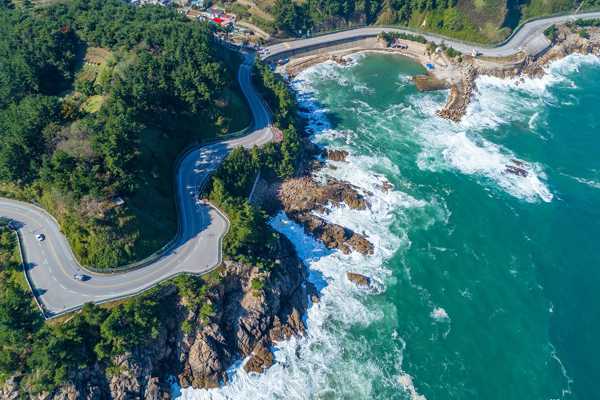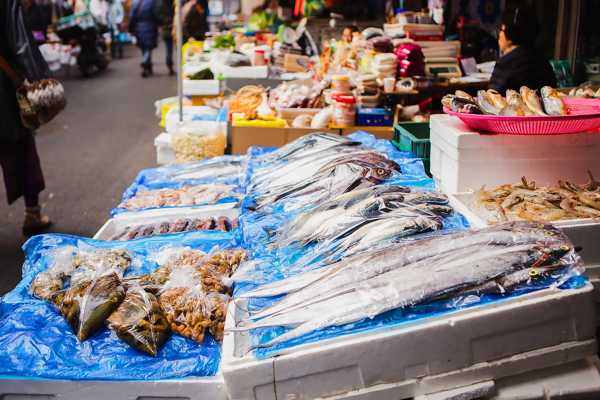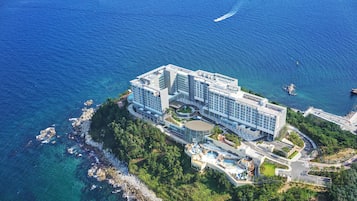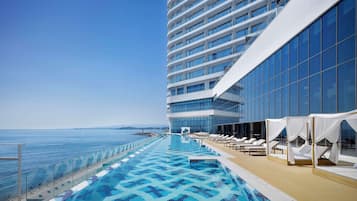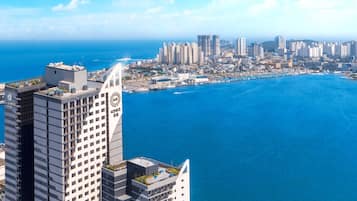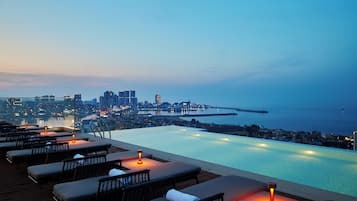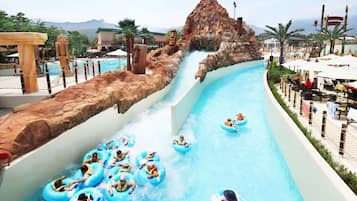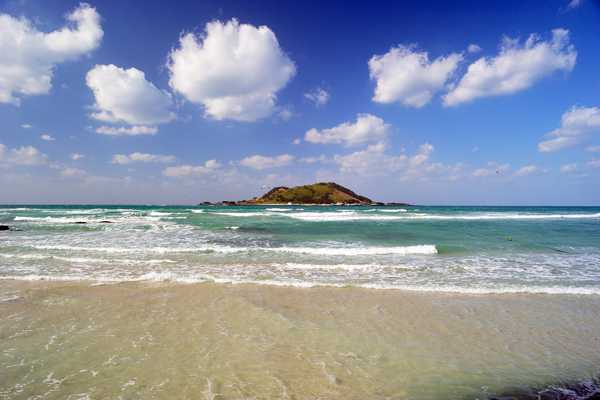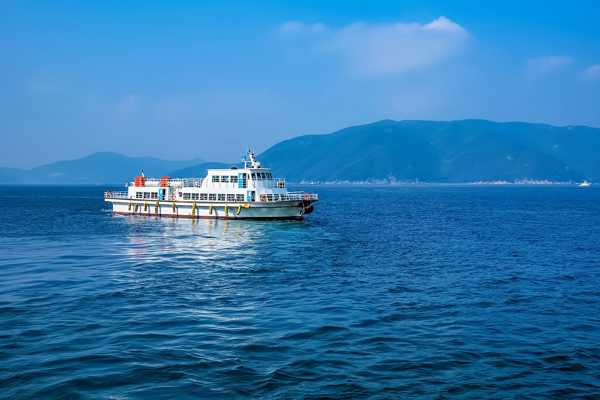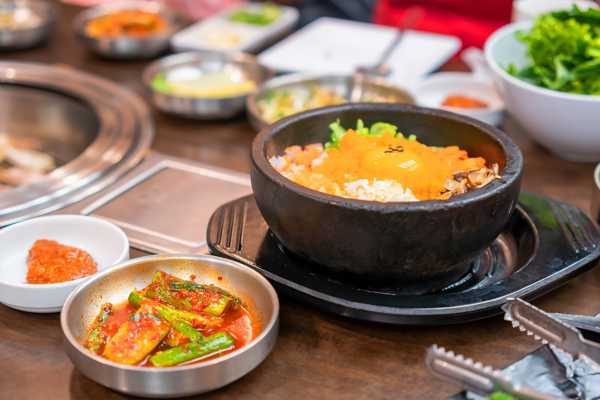The best things to do in Goseong range from visiting historic villages to beautiful beaches and insightful museums. As one of the few regions to change hands during the Korean War, Goseong is also home to an array of intriguing North Korean-themed sites.
Relatively few foreign visitors head to this far-flung South Korean province. Tucked away in the country’s northeast corner, it’s a brilliant option for travelers seeking to venture off the beaten path. Those who make the trip will be rewarded with authentic Korean culture influenced by the North and the South. Read on to discover what Goseong is famous for.
What are the best things to do in Goseong?
- 1
Goseong beaches
Discover scenic beaches dotting the coastline

- Budget
- Families
- Photo
Goseong boasts bountiful beautiful beaches, from pumping surf breaks to sheltered, family-friendly coves. During the balmy summer months, South Korean surfers and sun-seekers flock here to frolic in the pristine, clear-blue sea. But thankfully, Goseong county isn’t quite as popular as its southern neighbor, Sokcho-si. So, expect thinner crowds.
The busiest stretch of Goseong sand is Songjiho, a bustling beach with all the requisite amenities – showers, restrooms, camping, shops, parasols, and more. On choppy days, its gently rolling waves offer ideal conditions for beginner surfers. Take a stroll to the southern end to explore the stunning granite boulders at Seonangbawi Rock. If you’ve gotten little ones in tow, opt for the more sheltered Ayajin Beach instead.
- 2
Goseong Unification Observatory Tower
Lookout tower overlooking North Korea

- History
- Photo
The Goseong Unification Observatory Tower gives you a rare glimpse of North Korea and the chance to try authentic DPRK delicacies. From the top of the 70-metre tower, you can look out over (and photograph) the North’s Haegeumgang River and Geumgangsan Mountains – try to go on a clear day. Buy and try North Korean snacks and refreshing DPRK beer from the local vendors.
Located on the southern edge of the Demilitarized Zone (DMZ), it’s about as close to the reclusive northern state as most travelers will ever get. Bring some small change for the coin-operated North Korean Viewmasters. These charming archaic contraptions show 3D slides of utopian North Korean scenes. It’s also worth visiting the somber Korean War Exhibition Hall, which covers the horrors of the conflict in detail.
Location: 481 Geumgangsan-ro, Hyeonnae-myeon, Goseong-gun, Gangwon-do, South Korea
Open: Daily from 9 am to 4.30 pm
Phone: +82 (0)33-682-0088
Map - 3
Geonbongsa Temple
Sacred temple in a rural part of the Goseong
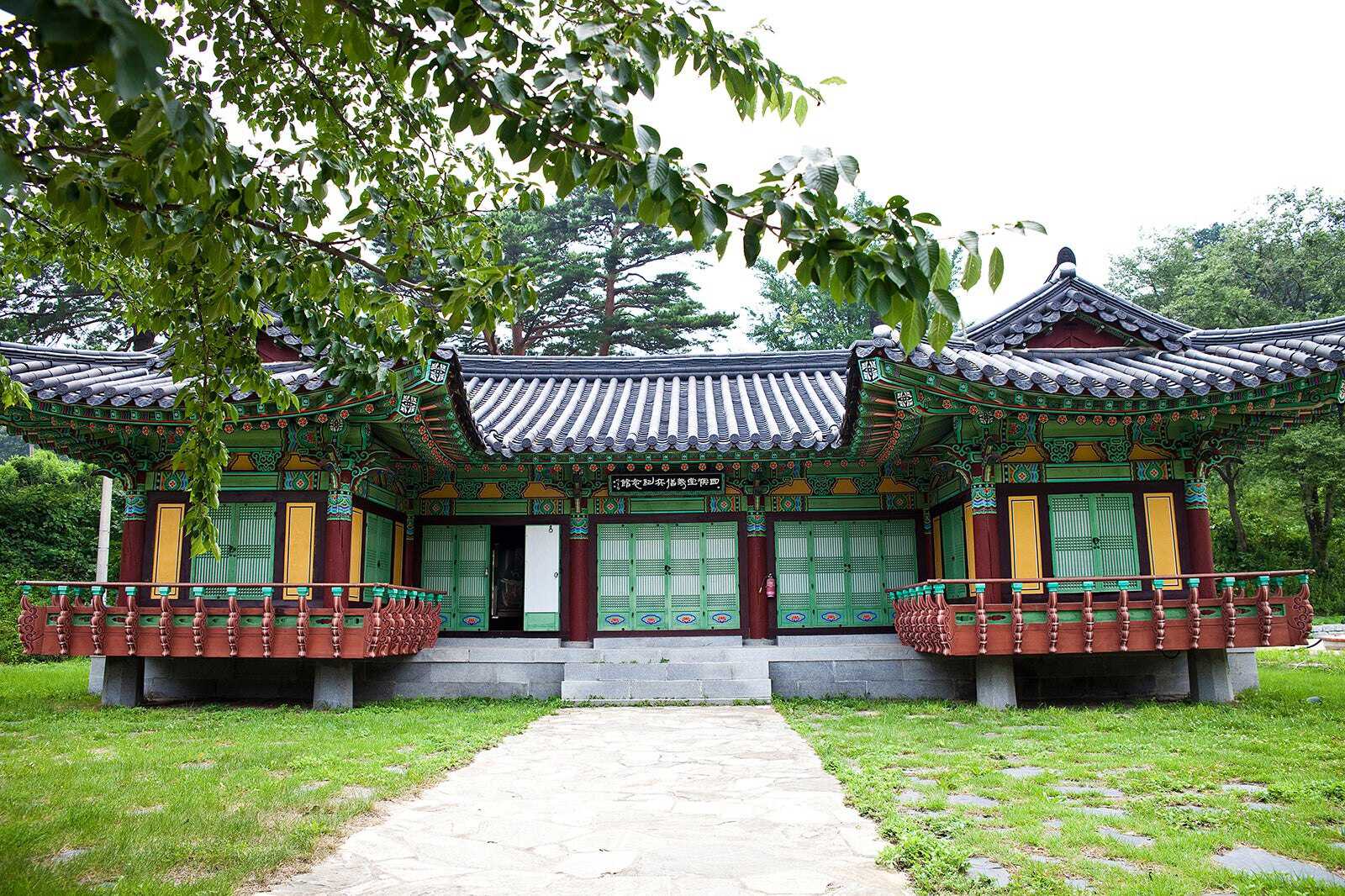
- History
- Photo
Geonbongsa Temple is a lovely old Buddhist shrine in a remote, rural region of Goseong. The site’s most fascinating artifact is Buddha’s tooth, a millennia-old sarira (relic) bought over from China during the Tang Dynasty. Also, keep an eye out for the Neungpagyo Bridge, a rainbow-shaped construction that dates back to the Joseon Dynasty.
Geonbongsa Temple once served as a monastery, training up large swathes of devout monks. The site also played a pivotal role in ancient Buddhist history, including the 10,000-day event where local monks ‘climbed to heaven’. This historical-religious importance makes it a popular destination among Korean Buddhists. Even so, few foreigners make the journey – there’s no public transportation or translations. Entry fees apply.
Location: 723 Geonbongsa-ro, Geojin-eup, Goseong-gun, Gangwon-do, South Korea
Phone: +82 (0)33-682-8100
Map - 4
Cheongganjeong Pavilion
Panoramic clifftop pavilion

- History
- Photo
Cheongganjeong Pavilion is an enchanting, mid-storey lookout affording stunning coastal views. The highlight of the intricate pavilion is its colorful hip-and-gable roof, handpainted in a kaleidoscope of color. Access to the building is via a raised wooden walkway slicing through thickly forested woodlands.
The pavilion sits perched on a clifftop to offer sweeping views of the Sea of Japan – it’s best admired at sunrise. Looking back inland, you’ll spot the tree-fringed Cheonggancheon Stream, a tranquil watercourse with a lovely green hue. The stream flows all the way down from the Seoraksan Mountain and empties into the sea via an estuary below the pavilion.
Location: 89-2 Cheonggan-ri, Toseong-myeon, Goseong-gun, Gangwon-do, South Korea
Map - 5
Goseong Wanggok Village
Charming traditional village in a scenic rural locale
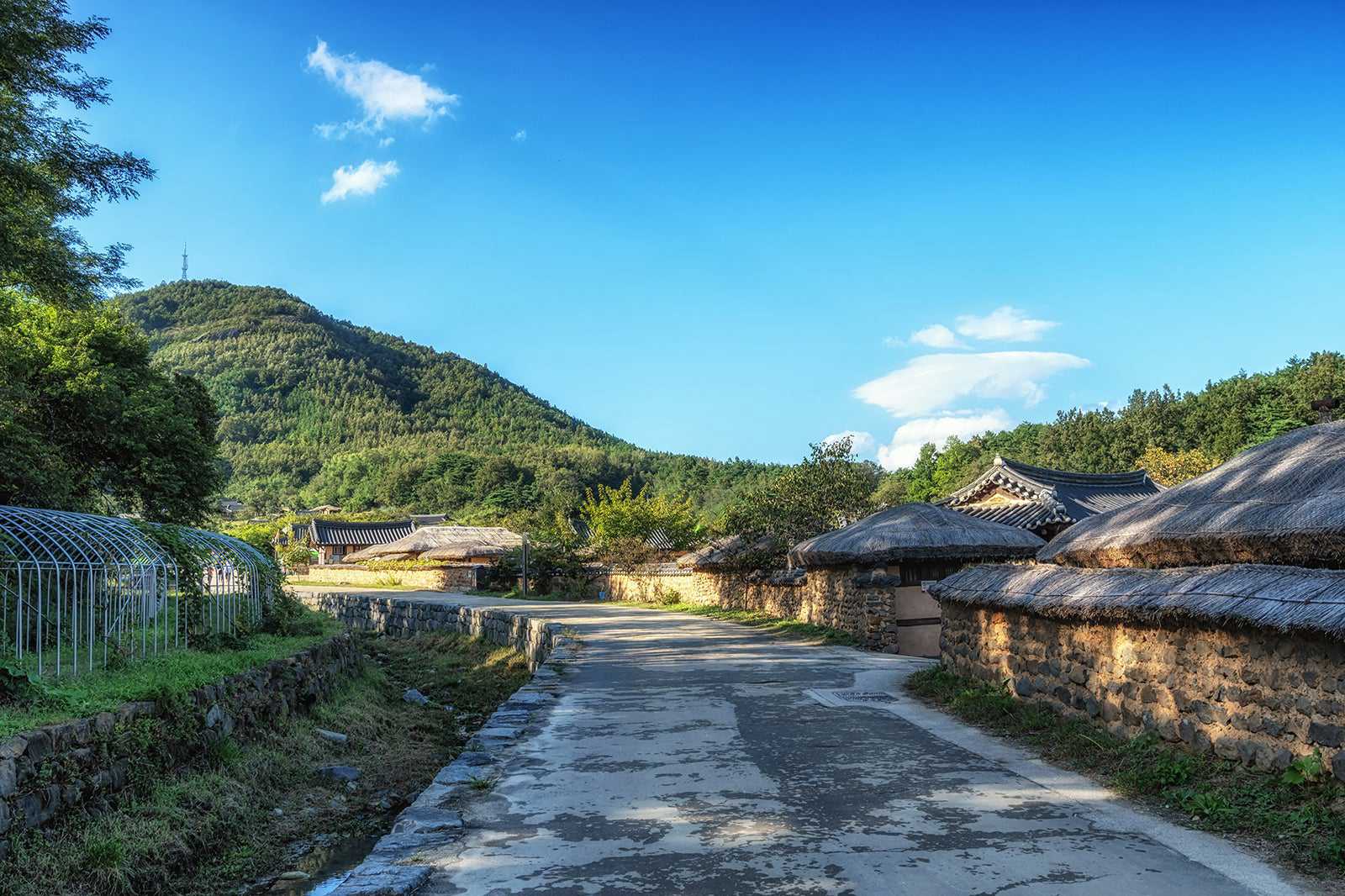
- Families
- Group
- History
- Photo
Goseong Wanggok Village is a charming rural settlement full of well-preserved hanok (traditional grass-roofed homes). As a designated Intangible Cultural Property, the village caters to visitors eager to experience what life was like in the pre-industrial era. Easy-to-follow signs lead visitors around the top public sites, including open homes, churches, and museums.
Built to house the Gangneung Hahm and Choi clans, the village remains inhabited today. The scenic settlement is set in a lush, valley-like basin surrounded by misty mountains. If you’re in the area in October, don’t miss the Wanggok Village Traditional Folk Experience Festival. The lively event features performances, mudfish catching, movie nights and horsecart rides.
Location: Obong-ri, Jugwang-myeon, Goseong-gun, Gangwon-do, South Korea
Phone: +82 (0)33-631-2120
Map - 6
Hani Lavender Farm
A vibrant flower farm and popular photo op

- Budget
- Couples
- Photo
The Hani Lavender Farm is a gorgeous purple flower field outside Goseong City. Although the site stays open year-round, the best time to visit is when the flowers blossom from May to August. If possible, aim to arrive in June for the Goseong Lavender Festival, a 3-week celebration of the peak blooming season.
Besides snapping Instagrammble pics amid a dreamy sea of purple, you can buy lavender-infused products at the Hani Lavender Farm. From ice cream and tea to essential oils and soaps, you’ll be amazed at the versatility of this fragrant flowering plant. Keep an eye out for the purple lavender-themed road leading toward the farm.
Location: 175 KR, Kkotdaemaeul-gil, Ganseong-eup, Goseong-gun, Gangwon-do, South Korea
Open: Daily from 9.30 am to 6.30 pm
Phone: +82 (0)33-681-0005
Map - 7
Neungpadae
A series of impressive granite sea rocks

- Adventure
- Budget
- Photo
Neungpadae is a series of scenic sea rocks a short drive south of Goseong City. Formed by millions of years of erosion, these oddly shaped granite boulders make for a good photo op. Don’t expect to stay dry when there’s a strong swell – the viewing promenade is highly susceptible to sea spray.
Aside from checking out the boulders, the area is an excellent spot to fish. Local tour operators can organize a day trip aboard a traditional fishing boat so you can cast a line. On a calm day, Neungpadae is an excellent place to snorkel or scuba dive.
Location: Munamjil-ri, Jugwang-myeon, Goseong-gun, Gangwon-do, South Korea
Map - 8
Hwajinpo
A lovely lake surrounded by waterfront villas

- Budget
- History
- Photo
Hwajinpo is a mirror-like, tree-lined lake to the north of Goseong City. While the Kim Ilseong Cottage is its most famous attraction, many other pretty villas overlook its shimmering waters. It’s worth dropping by the Ecological Museum and Marine Museum to learn about regional flora and fauna.
Tundra swans and other migratory birds descend on nearby wetlands while scenic walks circumnavigate the pristine lake. Look out for locals collecting samples of sand – the lake was heavily featured in the hit Korean TV drama Autumn in My Heart (2000).
Location: 280 Hwajinpo-gil, Geojin-eup, Goseong-gun, Gangwon-do, South Korea
Map - 9
DMZ Museum
A somber museum detailing the ongoing conflict dividing Korea
- Budget
- Group
- History
The DMZ Museum provides a wealth of information on the ongoing Korean conflict and highlights the people’s desire for unification. The large, multi-purpose center splits into 4 distinct zones, each with a unique theme. Besides obtaining insight into the conflict, you’ll also learn how nature has flourished in the entirely uninhabited Demilitarized Zone.
Despite its popularity, there’s no public transportation to the DMZ Museum. Most travelers arrive on an organized tour or by a rental car. It’s located at the northern tip of the county near the Goseong Unification Observatory Tower, so try to visit both sites in a single trip. Entry is free.
Location: 369 Tongiljeonmangdae-ro, Hyeonnae-myeon, Goseong-gun, Gangwon-do, South Korea
Open: Daily from 9 am to 6 pm
Phone: +82 (0)33-634-8553
Map - 10
Kim Ilseong Cottage Inn Hwajinpo
Lakeside villa of a former North Korean leader
- Budget
- History
- Photo
Kim Ilseong Cottage Inn is the former summer residence of late North Korean president, Kim Il Sung. Nowadays, the beautiful stone brick abode has been converted into an insightful history museum. Perched on a cliff above the glimmering Hwajinpo Lake, the villa also affords breathtaking views of both lake and sea.
The exhibition includes a small selection of Kim Il Sung’s possessions, including original furnishings and photographs from the era. You can sit and pose in the same chair used by the late president back in 1948. The modest entry fee includes admission to a small ecological museum that covers the region’s natural environment.
Location: 280 Hwajinpo-gil, Geojin-eup, Goseong-gun, Gangwon-do, South Korea
Open: Daily from 9 am to 6 pm
Phone: +82 (0)33-680-3677
Map


